The Everlasting Covenant
Chapter 37 – Again in Captivity
Turning Back to Egypt
Although the children of Israel sang the song of deliverance by the Red Sea, and with good reason, too, it was not until they had crossed the Jordan that they were really free from Egypt. They did not hold the beginning of their confidence steadfast unto the end, but “in their hearts turned back again into Egypt, saying unto Aaron, Make us gods to go before us.” Acts 7:39-40.
When they crossed the Jordan, however, and came into the land of Canaan, they had the testimony from God that the reproach of Egypt was rolled away from them. Then they had rest, and were free in the Lord. But this freedom was not long retained; murmuring, distrust, and apostasy soon appeared among God’s people.
They desired a king, that they might be like the heathen about them, and their desire was granted to the full.
They “mingled among the heathen, and learned their works. And they served their idols, which were a snare unto them, Yea, they sacrificed their sons and their daughters unto devils, and shed innocent blood, even the blood of their sons and of their daughters, whom they sacrificed unto the idols of Canaan; and the land was polluted with blood.” Psalm 106:35-38.
Thus they became literally like the heathen round them.
A little glance at the history of some of the kings of Israel and Judah will show how completely the children of Israel, in getting a king, had the fulfillment of their wish to be like the heathen.
To Saul, the first king, the prophet of God said,
“To obey is better than sacrifice, and to hearken than the fat of rams. For rebellion is as the sin of witchcraft, and stubbornness is as iniquity and idolatry. Because thou hast rejected the word of the Lord, He hath also rejected thee from being king.” 1 Samuel 15:22-23.
Solomon’s Idolatry
Solomon took many strange wives from among the heathen and
“it came to pass, when Solomon was old, that his wives turned away his heart after other gods; and his heart was not perfect with the Lord his God, as was the heart of David his father. For Solomon went after Ashtoreth, the goddess of the Zidonians, and after Milcom the abomination of the Ammonites.” 1 Kings 11:4-5.
Under Rehoboam, Solomon’s son, “Judah did evil in the sight of the Lord, and they provoked Him to jealousy with their sins which they had committed, above all that their fathers had done. For they also built them high places, and images, and groves, (The word “groves” in this and the following texts, is a very unfortunate, misleading rendering of the original. The Revision has “Asherah.” As we can see by carefully noting the use of the term, it cannot mean a grove of trees, since we read of groves being set up “under every green tree, and in the house of the Lord.” The thing itself was an obscene image pertaining to the lascivious rites of one form of sun-worship.) on every high hill, and under every green tree. And there were also Sodomites in the land; and they did according to all the abominations of the nations which the Lord cast out before the children of Israel.” 1 Kings 14:22-24.
The Ruin of Israel
The same thing is recorded of Ahaz (2 Kings 16:1-4), and although
“the Lord brought Judah low because of Ahaz king of Israel; for he made Judah naked, and transgressed sore against the Lord,” yet “in the time of his distress did he trespass yet more against the Lord; this is that king Ahaz. For he sacrificed unto the gods of Damascus, which smote him; and he said, Because the gods of the kings of Syria help them, therefore will I sacrifice to them, that they may help me. But they were the ruin of him, and of all Israel.” 2 Chronicles 28:19, 22-23.
Worse than the Heathen
Manasseh, son of Hezekiah,
“did that which was evil in the sight of the Lord, after the abominations of the heathen, whom the Lord cast out before the children of Israel. For he built up again the high places which Hezekiah his father had destroyed; and he reared up altars for Baal, and made a grove, as did Ahab king of Israel; and worshipped all the host of heaven, and served them. . . . And he built altars for all the host of heaven in the two courts of the house of the Lord. And he made his son pass through the fire, and observed times, and used enchantments, and dealt with familiar spirits and wizards: he wrought much wickedness in the sight of the Lord, to provoke Him to anger. And he set a graven image of the grove that he had made in the house, of which the Lord said to David, and to Solomon his son, In this house, and in Jerusalem, which I have chosen out of all the tribes of Israel, will I put My name for ever; neither will I make the feet of Israel move any more out of the land which I gave their fathers; only if they will observe to do according to all that I have commanded them, and according to all the law that My servant Moses commanded them. But they hearkened not; and Manasseh seduced them to do more evil than did the nations whom the Lord destroyed before the children of Israel.” “Moreover Manasseh shed innocent blood very much, till he had filled Jerusalem from one end to another; beside his sin wherewith he made Judah to sin, in doing that which was evil in the sight of the Lord.” 2 Kings 21:2-9; 16.
Amon succeeded Manasseh,
“but he did that which was evil in the sight of the Lord, as did Manasseh his father; for Amon sacrificed unto all the carved images which Manasseh his father had made, and served them.” 2 Chronicles 33:22.
A Record of Iniquity
If we take the kings that reigned over the northern portion of Israel after the kingdom was divided upon the death of Solomon, we find a worse record still. There were some righteous kings in Jerusalem; but beginning with Jeroboam, “who did sin, and who made Israel to sin” 1 Kings 14:16, each successive king over the rest of Israel was worse than the one before him.
Nadab, the son of Jeroboam, “did evil in the sight of the Lord, and walked in the way of his father, and in his sin wherewith he made Israel to sin.” 1 Kings 15:26.
Baasha “did evil in the sight of the Lord, and walked in the way of Jeroboam, and in his sin wherewith he made Israel to sin.” 1 Kings 15:34.
Omri, who built Samaria, “wrought evil in the eyes of the Lord, and did worse than all that were before him. For he walked in all the way of Jeroboam the son of Nebat, and in his sin wherewith he made Israel to sin, to provoke the Lord God of Israel to anger with their vanities.” 1 Kings 16:25-26.
Yet bad as Omri was, “Ahab the son of Omri did evil in the sight of the Lord above all that were before him;” “and Ahab did more to provoke the Lord to anger than all the kings of Israel that were before him.” 1 Kings 16:30, 33.
Thus matters went on until the Lord could say by the prophet Jeremiah,
“Run ye to and fro through the streets of Jerusalem, and see now, and know, and seek in the broad places thereof, if ye can find a man, if there be any that executeth judgment, that seeketh truth.” Jeremiah 5:1.
Such a man was hard to find;
“For among My people are found wicked men; they lay wait, as he that setteth snares; they set a trap, they catch men. As a cage is full of birds, so are their houses full of deceit; therefore are they become great, and waxen rich. They are waxen fat, they shine; yea, they overpass the deeds of the heathen.” Jeremiah 5:26-28.
Not Inheritors, but Slaves
Inasmuch as God drove the heathen out of the land, because of their abominable idolatry, it is very evident that the children of Israel could have no real inheritance in it when they were just like the heathen, and even worse. The fact that those who call themselves by the name of the Lord, adopt heathen customs and manners, does not make these customs one bit more acceptable to God.
The fact that heathenism is in the church, does not recommend it.
On the contrary, a high profession only makes the evil practice more heinous. The children of Israel were therefore not really in possession of the land of Canaan while they were following the ways of the heathen; nay, since the reproach of the bondage in Egypt was the sin into which they had fallen, it is evident that even while boasting of their freedom in the land of Canaan they were actually in the worst kind of bondage.
When at a later date the Jews boastingly said, “We be Abraham’s seed, and have never yet been in bondage to any man,” Jesus repeated, “Verily, verily, I say unto you, every one that committeth sin is the bondservant of sin. And the bondservant abideth not in the house for ever; the Son abideth ever.” John 8:33-35. R.V.
God’s Faithfulness
Yet there were wondrous possibilities all the time within reach of the people. At any time they might have repented and turned to the Lord, and they would have found Him ready to fulfill His promise to them to the uttermost. Although
“all the chief of the priests and the people, transgressed very much after all the abominations of the heathen,” still “the Lord God of their fathers sent to them by His messengers, rising up betimes, and sending; because He had compassion on His people, and on His dwelling-place.” 2 Chronicles 36:14-15.
Many wonderful deliverances, when the Israelites were oppressed by their enemies, and humbly sought the Lord, showed that the same God who delivered their fathers from Egypt, was ready and waiting to exert the same power in their behalf, in order to perfect that for which He had brought them into the promised land.
A Victory of Faith
One remarkable instance of the working of God for those who trust Him, and of the victory of faith, is found in the history of Jehoshaphat (2 Chronicles 20.) It is specially valuable to us, for it shows us how to gain victories; and it also shows us again, what we have so many times noted, that the real victories of Israel were gained by faith in God, and not by the use of the sword.
The story in brief is this:– The Moabites and the Ammonites, together with other people, came against Jehoshaphat to battle. Their numbers were vastly in excess of those of the Israelites, and in their
“Jehoshaphat feared, and set himself to seek the Lord, and proclaimed a fast throughout all Judah. And Judah gathered themselves together, to ask help of the Lord; even out of all the cities of Judah they came to seek the Lord.”
A Model Prayer
Jehoshaphat’s prayer on that occasion is a model. He said,
“O Lord God of our fathers, art not Thou God in Heaven? and rulest not Thou over all the kingdoms of the heathen? and in Thine hand is there not power and might, so that none is able to withstand Thee? Art Thou not our God, who didst drive out the inhabitants of this land before Thy people Israel, and gavest it to the seed of Abraham Thy friend for ever? . . . And now, behold the children of Ammon and Moab and Mount Seir. . . . how they reward us, to come to cast us out of Thy possession, which Thou hast given us to inherit. O Lord our God, wilt Thou not judge them? for we have no might against this great company that cometh against us; neither know we what to do; but our eyes are upon Thee.”
First he recognized God as God in heaven, and therefore having all power. Next he claimed all this power as his own by claiming God as his own God. Then he was ready to make known his need, and to prefer his request, with full assurance of faith. To one who prays in that way, all things are possible. Too many offer prayer to God, without any just sense of His existence, as though they were praying to an abstract name, and not to a living, personal Saviour, and of course they receive nothing, for they do not really expect anything. Everyone who prays should first contemplate God, before thinking of himself and his own needs. It is doubtless the case that most people when they pray think more about themselves than they do of God; instead of that, they should become lost in contemplation of God’s greatness and His kindness; then it is not difficult to believe that God is a rewarder of them that diligently seek Him. As the Psalmist said, “They that know Thy name will put their trust in Thee; for Thou, Lord, hast not forsaken them that seek Thee.” Psalm 9:10.
The Prayer Answered
While the people were still gathered to pray, the prophet of God came, and said,
“Hearken ye, all Judah, and ye inhabitants of Jerusalem, and thou King Jehoshaphat, Thus saith the Lord unto you, Be not afraid nor dismayed, for the battle is not yours, but God’s.” “Ye shall not need to fight in this battle; set yourselves, stand ye still, and see the salvation of the Lord with you, O Judah and Jerusalem; fear not, nor be dismayed; to-morrow go out against them; for the Lord will be with you.”
The people believed this message,
“and they rose early in the morning and went forth into the wilderness of Tekoa; and as they went forth, Jehoshaphat stood, and said, Hear me, O Judah, and ye inhabitants of Jerusalem; Believe in the Lord your God, so shall ye be established; believe His prophets, so shall ye prosper. And when he had consulted with the people, he appointed singers unto the Lord, and that should praise the beauty of holiness, as they went out before the army, and to say, Praise the Lord: for His mercy endureth for ever.”
The Song of Victory
A strange way that, to go out to battle.
It reminds us somewhat of the march round Jericho, and the shout of victory. As a general thing, people getting such a promise as they did at that time, that God would fight for them, would think that they showed great faith in going out at all against the enemy. They would say, “God has promised to help us, but we must do our part;” and so they would make every preparation for fighting. But these people at that time were just simple enough to take the Lord at His word; they knew that they must indeed do their part, but they knew that their part was to believe, and to go forward as though they did really believe. And they did believe. So strong was their faith, that they sang. It was no forced song that was heard, weakly issuing from trembling lips, but a full, deep, spontaneous, hearty song of joy and victory, and all this while the enemy was before them in overwhelming numbers. And what was
The Result
“And when they began to sing and to praise, the Lord set ambushments against the children of Ammon, Moab, and Mount Seir, which were come against Judah; and they were smitten. For the children of Ammon and Moab stood up against the inhabitants of Mount Seir, utterly to slay and destroy them; and when they had made an end of the inhabitants of Seir, every one helped to destroy another. And when Judah came toward the watch tower in the wilderness, they looked unto the multitude, and, behold, they were dead bodies fallen to the earth, and none escaped.”
Reinforcements
As soon as they began to sing, the enemy was overthrown.
A panic seized the host of Ammonites and Moabites, and they beat down one another. It may well be that, when they heard the songs and shouts of joy, they thought that Israel had received reinforcements, and such was the case. The people of Israel had such reinforcements that they did not need to do any fighting themselves.
Their faith was their victory, and their singing was the evidence of their faith.
The Lesson for Us
This is a lesson for us in our conflicts with our adversaries– principalities and powers and wicked spirits. “Resist the devil, and he will flee from you;” but we are to “resist steadfast in the faith.” Only such resistance will cause him to flee, for he knows that he is stronger than we; but when he is resisted in the faith of Jesus, he must flee, for he knows that he has no strength at all against Christ. And so we learn again that “the redeemed of the Lord shall return, and come with singing unto Zion.” In such experiences as that just considered, the Lord was showing Israel how they should overcome, and that He was always waiting and anxious to complete the promise made to the fathers.
What Might Have Been
We know that at any time within a a period of several hundred years the children of Israel might have enjoyed the fullness of the promise to Abraham,– eternal rest in the earth made new, with Christ and all the glorified saints victorious over the last enemy,–because when Moses was born the time of the promise had drawn near, and Joshua did not die until “a long time after that the Lord had given rest unto Israel.” Joshua 23:1.
The time when God through David offered them “another day,”–to-day,–is spoken of as “after so long a time.” God was anxiously waiting for the people to take all that He had given them. How true this is may be seen by His words to them by the prophet Jeremiah.
Even though the people were so firmly fixed in their idolatry, that the sin of Judah was written with a pen of iron and with the point of a diamond, the gracious Lord made the following promise:–
“Thus saith the Lord unto Me; Go and stand in the gate of the children of the people, whereby the kings of Judah come in, and by which they go out, and in all the gates of Jerusalem: and say unto them, Hear ye the word of the Lord, ye kings of Judah, and all Judah, and all the inhabitants of Jerusalem, that enter in by these gates: thus saith the Lord: Take heed to yourselves, and bear no burden on the Sabbath day, nor bring it in by the gates of Jerusalem; neither carry forth a burden out of your houses on the Sabbath day, neither do ye any work, but hallow ye the Sabbath day, as I commanded your fathers. But they obeyed not, neither inclined their ear, but made their neck stiff, that they might not hear, nor receive instruction. And it shall come to pass, if ye diligently hearken unto Me, saith the Lord, to bring in no burden through the gates of this city on the Sabbath day, but hallow the Sabbath day, to do no work therein; then shall there enter into the gates of this city kings and princes sitting upon the throne of David, riding in chariots and on horses, they, and their princes, the men of Judah, and the inhabitants of Jerusalem: and this city shall remain for ever. And they shall come from the cities of Judah, and from the places about Jerusalem, and from the land of Benjamin, and from the plain, and from the mountains, and from the south, bringing burnt offerings, and sacrifice, and meat offerings, and incense, and bringing sacrifices of praise, unto the house of the Lord.” Jeremiah 17:19-26.
It is not for us to speculate as to how this promise would have been fulfilled; it is enough for us to know that God said it, and He is able to make every promise good. To build up the old city, and make it new would certainly have been as easy as to “change our vile body, that it may be fashioned like unto His glorious body,” Philippians 3:21, or to make an entirely new city to take the place of the old one.
Rejected Promises
Bear in mind that this promised by Jeremiah was in the very last days of the kingdom of Judah, for Jeremiah did not begin to prophesy till “the days of Josiah the son of Amon,” Jeremiah 1:2, in the thirteenth year of his reign, only twenty-one years before the beginning of the Babylonian captivity.
Before Jeremiah began to prophesy, nearly all the prophets had finished their labours, and passed away. The prophecies of Isaiah, Hosea, Amos, Micah, and others–all the principal prophets–were in the hands of the people before Jeremiah was born.
This is a fact that should by no means be overlooked, for it is most important.
In those prophecies are many promises of the restoration of Jerusalem, all of which might have been fulfilled if the people had given heed. But like all God’s promises, they were in Christ; they pertained, like the one before us, to eternity, and not simply to time. But since the people of those days did not accept them they remain equally fresh for us. They could be fulfilled only by the coming of the Lord, for whom we are now looking. Those prophecies contain the Gospel for this time, just as surely as do the books of Matthew and John and the Epistles.
The Test of Obedience
Notice further that the keeping of the Sabbath is made the test, to all to whom that truth is revealed.
If they kept the Sabbath, then they and their city would endure for ever.
Why was this?–Recall what we have studied about God’s rest, and you have the answer.
The Sabbath is the seal of creation finished and perfect.
As such it reveals God as Creator and Sanctifier (Ezekiel 20:12, 20), as Sanctifier by His creative power.
The Sabbath is not a work, by which we may vainly try to win the favour of God, but it is rest–rest in the everlasting arms. It is the sign and memorial of God’s eternal power; and the keeping of it is the seal of that perfection which God alone can work out, and which He freely bestows upon all who trust Him.
It means full and perfect trust in the Lord, that He can and will save us by the same power by which He made all things in the beginning.
Therefore we see that since the same promise is left us, that was given to ancient Israel, it must necessarily be that the Sabbath also should be made specially prominent in our day, more especially as the day of Christ’s coming approaches.
The Judgment Threatened
But there was an alternative, in case the people refused to rest in the Lord. The prophet was commissioned to say still further:–
“But if ye will not hearken unto Me, to hallow the Sabbath day, and not to bear a burden, even entering into the gates of Jerusalem on the Sabbath day; then will I kindle a fire in the gates thereof, and it shall devour the palaces of Jerusalem, and it shall not be quenched.” Jeremiah 17:27.
Fulfillment
And so it was; although God was faithful and longsuffering in sending messages of warning to His people,
“they mocked the messengers of God, and despised His words, and misused His prophets, until the wrath of the Lord arose against His people, till there was no remedy. Therefore He brought upon them the king of the Chaldees, who slew their young men with the sword in the house of their sanctuary, and had no compassion upon young man or maiden, old man, or him that stooped for age; He gave them all into his hand. And all the vessels of the house of God, great and small, and the treasures of the house of the Lord, and the treasures of the king, and of his princes; all these he brought to Babylon. And they burnt the house of God, and brake down the wall of Jerusalem, and burnt all the palaces thereof with fire, and destroyed all the goodly vessels thereof. And them that had escaped from the sword carried he away to Babylon; where they were servants to him and his sons until the reign of the kingdom of Persia; to fulfill the word of the Lord by the mouth of Jeremiah, until the land had enjoyed her Sabbaths; for as long as she lay desolate she kept Sabbath, to fulfill threescore and ten years.” 2 Chronicles 36:16-21.
Israel under Babylonian Sway
The last king in Jerusalem was Zedekiah, but he was not an independent king. Several years before he came to the throne, Nebuchadnezzar had besieged Jerusalem, and the Lord had given the city to him. Daniel 1:1-2.
Although Jehoiakim was overcome, he was allowed to reign in Jerusalem as a tributary prince, which he did for eight years. At his death, his son Jehoiachin succeeded him, but he reigned only three months before Nebuchadnezzar besieged Jerusalem again, and conquered it, and carried the king and his family and all the craftsmen and smiths away to Babylon; “none remained save the poorest sort of the people of the land.” 2 Kings 24:8-16.
Zedekiah’s Perjury and Rebellion
Still there was a king left in Jerusalem, for Nebuchadnezzar made Mattaniah king, changing his name to Zedekiah. 2 Kings 24:17.
The word Zedekiah means ‘the righteousness of Jehovah,’ and was given to the new-made king because Nebuchadnezzar “made him swear by God” 2 Chronicles 36:13, that he would not rebel against his authority.
That Nebuchadnezzar had a right to demand this, is shown by the following:–
“In the beginning of the reign of Jehoiakim the son of Josiah king of Judah, came this word unto Jeremiah from the Lord, saying, Thus saith the Lord to me; Make thee bonds and yokes, and put them upon thy neck, and send them to the king of Edom, and to the king of Moab, and to the king of the Ammonites, and to the king of Tyrus, and to the king of Zidon, by the hand of the messengers which come to Jerusalem unto Zedekiah king of Judah: And command them to say unto their masters, Thus saith the Lord of hosts, the God of Israel; Thus shall ye say unto your masters: I have made the earth, the man and the beast that are upon the ground, by My great power and by My outstretched arm, and have given it unto whom it seemed meet unto Me. And now have I given all these lands into the hand of Nebuchadnezzar the king of Babylon, My servant; and the beasts of the field have I given him also to serve him. And all nations shall serve him, and his son, and his son’s son, until the very time of his land come: and then many nations and great kings shall serve themselves of him. And it shall come to pass that the nation and kingdom which will not serve the same Nebuchadnezzar the king of Babylon, and that will not put their neck under the yoke of the king of Babylon, that nation will I punish, saith the Lord, with the sword, and with the famine, and with the pestilence, until I have consumed them by his hand. Therefore hearken not ye to your prophets, nor to your diviners, nor to your dreamers, nor to your enchanters, nor to your sorcerers, which speak unto you, saying, Ye shall not serve the king of Babylon: for they prophesy a lie unto you, to remove you far from your land; and that I should drive you out, and ye should perish. But the nations that bring their neck under the yoke of the king of Babylon, and serve him, those will I let remain still in their own land, saith the Lord; and they shall till it, and dwell therein.” Jeremiah 27:1-11.
Nebuchadnezzar’s Right to Rule in Judea
Nebuchadnezzar, therefore, had as much right to rule in Jerusalem as any of the kings of Israel had ever had. His kingdom, moreover, was more extensive than that over which any king of Israel had ruled; and, more than all, after much instruction from the Lord, he used his opportunity to spread throughout all the world the knowledge of the true God. (See Daniel 4.)
Therefore when Zedekiah rebelled against Nebuchadnezzar, he was wickedly setting himself against the Lord, who had given Israel into the power of Nebuchadnezzar, as a punishment for their sins. In the following words, we have a graphic description of the movement of Nebuchadnezzar against Jerusalem, and how God guided the action of the heathen king even while he was using divination:–
“Also, thou son of man, appoint thee two ways, that the sword of the king of Babylon may come: both twain shall come forth out of one land: and choose thou a place, choose it at the head of the way to the city. Appoint a way, that the sword may come to Rabbath of the Ammonites, and to Judah in Jerusalem the defensed. For the king of Babylon stood at the parting of the way, at the head of the two ways, to use divination; he made his arrows bright, he consulted with images, he looked in the liver. At his right hand was the divination for Jerusalem, to appoint captains, to open the mouth in the slaughter, to lift up the voice with shouting, to appoint battering rams against the gates, to cast a mount, and to build a fort. And it shall be unto them as a false divination in their sight, to them that have sworn oaths: but he will call to remembrance the iniquity, that they may be taken. Therefore thus saith the Lord God: Because you have made your iniquity to be remembered, in that your transgressions are discovered, so that in all your doings your sins do appear: because, I say, that ye are come to remembrance, ye shall be taken with the hand.”
End of Israel’s Temporal Dominion
Then follow the fateful words addressed to Zedekiah:–
“And thou, profane wicked prince of Israel, whose day is come, when iniquity shall have an end, Thus saith the Lord God: Remove the diadem, and take off the crown: this shall not be the same: exalt him that is low, and abase him that is high. I will overturn, overturn, overturn it: and it shall be no more, until He come whose right it is: and I will give it Him.” Ezekiel 21:19-27.
Zedekiah was profane and wicked, because to all his abominable idolatry he added the sin of perjury, breaking a solemn oath. Therefore the kingdom was utterly removed. The diadem passed from the descendants of David, and was placed on the head of a Chaldean, and the kingdom of Babylon is before us. Of its extent we have already read, and we have further the words of the prophet Daniel in explanation of the great image that Nebuchadnezzar saw in a dream given him by the God of heaven:–
Universal Dominion
“Thou, O king, art a king of kings; for the God of heaven hath given thee a kingdom, power, and strength, and glory. And wheresoever the children of men dwell, the beasts of the field and the fowls of the heaven hath He given into thine hand, and hath made thee ruler over them all. Thou art this head of gold.” Daniel 2:37-38.
In this we trace the dominion which in the beginning was given to man (see Genesis 1:26), although the glory and power were greatly diminished.
But we see that God still had His eye upon it, and was working towards its restoration, according to the promise to Abraham.
A Brief World History
Very little time is devoted in the Bible to descriptions of human grandeur, and the prophet hastens to the end.
Three overturnings or revolutions are foretold in Ezekiel 21:27, following the passing of the dominion of the whole earth into the hands of Nebuchadnezzar.
As his kingdom was world-wide, the revolutions foretold must also be the overthrow and establishment of a universal empire.
So the prophet Daniel, continuing his explanation of Nebuchadnezzar’s dream, said:–
Medo-Persia and Greece
“And after thee shall arise another kingdom inferior to thee, and another third kingdom of brass, which shall bear rule over all the earth.” Daniel 2:39.
The kingdom that succeeded the Babylonian is shown in Daniel 5. to have been that of Medo-Persia; and in Daniel 8:1-8, 20-21 we learn that the third kingdom, the successor of Medo-Persia in universal worldly dominion, was that of Grecia.
Thus briefly have we outlined before us the history of the world for several hundred years.
The first two overturnings of Ezekiel 21:27 are made clear; Babylon was followed by Medo-Persia, and that in turn by the Grecian empire.
Roman Rule
The last of this earth’s universal kingdoms, following the third great revolution, is not directly named, but it is clearly enough indicated.
The birth of Christ took place in the days of Caesar Augustus, who issued a decree that all the world should be taxed or enrolled. (Luke 2:1.) Therefore we are warranted in naming Rome as the product of the third great world revolution.
In fact, we are shut up to that empire, for there is none other known to history that could take its place.
Babylon conquered the kingdom of Israel, and its dominion was world-wide; in its days three revolutions were foretold, bringing three successive empires in its stead; Medo-Persia and Greece are expressly named in the line of succession, and then we have the emperor of Rome named as ruling the world.
This is strictly Scriptural evidence; corroborative evidence, or rather, evidence testifying to the exactness of the sacred record, may be found without limit in secular history.
The Last Revolution
But the revolution that resulted in giving the rulership of the world to Rome, was the last general revolution that shall take place in this world “until He come whose right it is.”
Many men since Rome fell have dreamed of world-wide dominion, but their dreams have come to naught.
Christ was on earth, it is true, but it was as a stranger, like Abraham, with no place of His own where He could lay His head.
He came, however, “to proclaim liberty to the captives,” and announced that whoever would abide in His word should know the truth, and be made free by it.
Day by day and year after year as the centuries have rolled by, the proclamation of freedom has been sounding, and weary captives have been set free from the power of darkness. It is not for us to know the times and the seasons which the Father has put in His own power; but we know that when all the professed church of Christ shall consent to be filled with His Spirit, the whole world will soon hear the Gospel message in the fulness of its power, and the end will come, when the groaning creation itself will be delivered from the bondage of corruption into the glory of the liberty of the children of God.

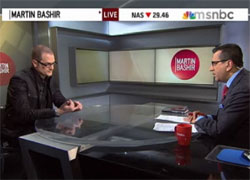
 In Chapter Four of Love Wins, Bell criticizes some statements of faith that he has taken from evangelical church websites that reflect Jesus’ teachings on Hell: “The unsaved will be separated forever from God in hell.” After giving a number of examples with which he feels uncomfortable, Bells states,
In Chapter Four of Love Wins, Bell criticizes some statements of faith that he has taken from evangelical church websites that reflect Jesus’ teachings on Hell: “The unsaved will be separated forever from God in hell.” After giving a number of examples with which he feels uncomfortable, Bells states, 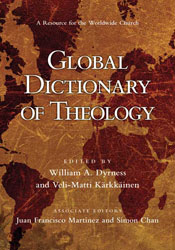 The emergent-friendly, Global Dictionary of Theology, makes a distinction between ‘Hopeful Universalism’ and ‘Convinced Universalism’:
The emergent-friendly, Global Dictionary of Theology, makes a distinction between ‘Hopeful Universalism’ and ‘Convinced Universalism’: Indeed, in the very preface of Love Wins, Bell contradicts Jesus’ teaching that few would actually be saved. Bell writes:
Indeed, in the very preface of Love Wins, Bell contradicts Jesus’ teaching that few would actually be saved. Bell writes: It is a sobering thought that Jesus went on to state in the verses immediately following His teaching on the narrow and broad roads, that false prophets would come in sheep’s clothing (Matthew 7:15-21). Such false prophets stand at the cross roads between the broad and narrow road, claiming to represent Christ, while pointing their followers toward the broad road that leads destruction, assuring them that it eventually leads to Heaven. Consider this for a minute. Isn’t this exactly what Rob Bell is doing?
It is a sobering thought that Jesus went on to state in the verses immediately following His teaching on the narrow and broad roads, that false prophets would come in sheep’s clothing (Matthew 7:15-21). Such false prophets stand at the cross roads between the broad and narrow road, claiming to represent Christ, while pointing their followers toward the broad road that leads destruction, assuring them that it eventually leads to Heaven. Consider this for a minute. Isn’t this exactly what Rob Bell is doing? Rob Bell not only redefines Hell by teaching that it will only be a temporary abode for those who want to leave later, but he redefines Hell by claiming that it is not so much about the after life, but it’s about what you make of the life here and now. In his book, Velvet Elvis, Bell had already stated this position:
Rob Bell not only redefines Hell by teaching that it will only be a temporary abode for those who want to leave later, but he redefines Hell by claiming that it is not so much about the after life, but it’s about what you make of the life here and now. In his book, Velvet Elvis, Bell had already stated this position: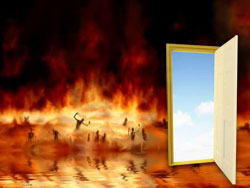 Rob Bell takes every possible liberty to deny reality and to either explain Hell away or get everyone into Heaven, regardless of his or her rejection of God and the Gospel. Bell not only empties Hell of God’s holy wrath, he creates an exit door from the inside out and claims that Hell is merely what we make it. He also claims that most of the imagery of future judgments in Hell were fulfilled on earth in AD 70 (p. 81).
Rob Bell takes every possible liberty to deny reality and to either explain Hell away or get everyone into Heaven, regardless of his or her rejection of God and the Gospel. Bell not only empties Hell of God’s holy wrath, he creates an exit door from the inside out and claims that Hell is merely what we make it. He also claims that most of the imagery of future judgments in Hell were fulfilled on earth in AD 70 (p. 81).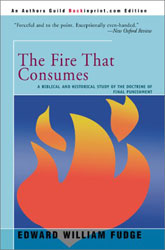 By claiming that the unrepentant wicked will have a chance to get to Heaven from Hell, Rob Bell has gone beyond that of Edward W. Fudge, who states in The Fire That Consumes,
By claiming that the unrepentant wicked will have a chance to get to Heaven from Hell, Rob Bell has gone beyond that of Edward W. Fudge, who states in The Fire That Consumes, 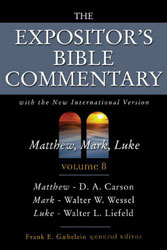 Biblical Scholar D.A. Carson, commenting on Matthew 25:46, says :
Biblical Scholar D.A. Carson, commenting on Matthew 25:46, says :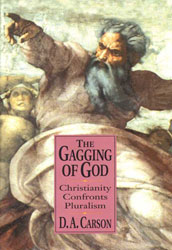 “What is hard to prove, but seems to me probable, is that one reason why the conscious punishment of hell is ongoing is because sin is ongoing.”
“What is hard to prove, but seems to me probable, is that one reason why the conscious punishment of hell is ongoing is because sin is ongoing.” There is hardly any wiggle room for a second chance in hell in these passages or anywhere in Scripture. Bell would have his readers believe of the book of Revelation that
There is hardly any wiggle room for a second chance in hell in these passages or anywhere in Scripture. Bell would have his readers believe of the book of Revelation that  May God give us the grace, in these times of apostasy, to hold fast to Jesus’ teachings and remain faithful to our loving and Holy Lord to the end. May God deliver His bride from the cotton candy Christianity that is endemic in Emergent Churches and among false prophets who lead the lost into believing they can put off repentance until after death.
May God give us the grace, in these times of apostasy, to hold fast to Jesus’ teachings and remain faithful to our loving and Holy Lord to the end. May God deliver His bride from the cotton candy Christianity that is endemic in Emergent Churches and among false prophets who lead the lost into believing they can put off repentance until after death.
Leave a Reply